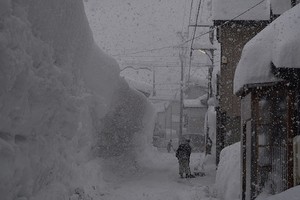December 28, 2022 at 13:44 JST
 Chinese citizens line up at a clinic in Beijing on Dec. 9. (Asahi Shimbun file photo)
Chinese citizens line up at a clinic in Beijing on Dec. 9. (Asahi Shimbun file photo)
China’s abrupt decision to ease its “zero COVID” policy of strict government restrictions rapidly and radically in response to a nationwide wave of protests has triggered an exponential spread of novel coronavirus infections.
Beijing also announced that starting Jan. 8 it will scrap quarantine requirements for all international arrivals. The Chinese government, however, has not offered any specific reason for its decision to ease COVID-19 curbs nor disclosed sufficient information about mass outbreaks.
Three years have passed since the first case of COVID-19 was confirmed in Wuhan, the capital of China’s Hubei province. During these stormy three years, countries responded to the pandemic with trial-and-error measures while beset by new variants that emerged one after another.
In sharp contrast, China managed to mostly suppress the virus through a combination of mass testing, strict “lockdowns” and border closures under its “zero COVID” policy. It is true that the number of cases in China remained much smaller than in most other nations.
A key factor behind Beijing’s obstinate adherence to its draconian anti-COVID policy is its inadequate health care system. There has been no notable improvement in this area over the past three years.
To make matters worse, the government has not staged a comprehensive vaccination drive targeting the millions of vulnerable older adults. Patients forced to stay at home while they convalesce are rushing to buy medical products, causing serious shortages. Clearly, the government failed to make adequate preparations for the policy change.
An even more serious problem concerns a lack of sufficient information disclosure. Daily numbers of new COVID-19 cases announced by the public health authority hover in the thousands with no deaths reported most days. The figures are far from credible.
What is happening now is reminiscent of how the Chinese government bungled its initial response to an outbreak of severe acute respiratory syndrome (SARS), a deadly viral respiratory disease first identified in China in 2003. At that time as well, Beijing balked at ensuring transparency.
China’s Communist Party regime tends to keep a tight lid on information under the pretext of preventing social unrest. By refusing to provide accurate information during a public health crisis, the government risks alienating an already anxious public and damaging its own credibility. That is a lesson the administration of President Xi Jinping should take to heart.
The World Health Organization has urged China to provide detailed information on the current situation, such as the number of serious cases, and offered to cooperate to gather related data. As a nation that accounts for 18 percent of global population, China has an obligation to share data about the spread of the virus within its border to help the world better tackle the health hazards posed by the virus.
In the meantime, some local governments in China, such as the city of Qingdao in Shandong province, have started announcing their own estimates of cases. These moves are notable as potential signs of growing awareness of the importance of transparency in policy efforts concerning the wellbeing of citizens.
With the annual travel rush during the Lunar New Year holidays looming, the government needs to take steps to provide better support to rural areas with underdeveloped health care infrastructures as well as to the elderly and people in ill health.
Chinese vaccines are believed to be ineffective for the Omicron variant currently raging in the country. Beijing should consider importing Western vaccines as an emergency step. It should use the policy change as an opportunity to expand cooperation with the international community.
The Xi administration should not try to save face at the expense of the people’s health.
--The Asahi Shimbun, Dec. 28




















A peek through the music industry’s curtain at the producers who harnessed social media to help their idols go global.
A series based on diplomatic documents declassified by Japan’s Foreign Ministry
Here is a collection of first-hand accounts by “hibakusha” atomic bomb survivors.
Cooking experts, chefs and others involved in the field of food introduce their special recipes intertwined with their paths in life.
A series about Japanese-Americans and their memories of World War II